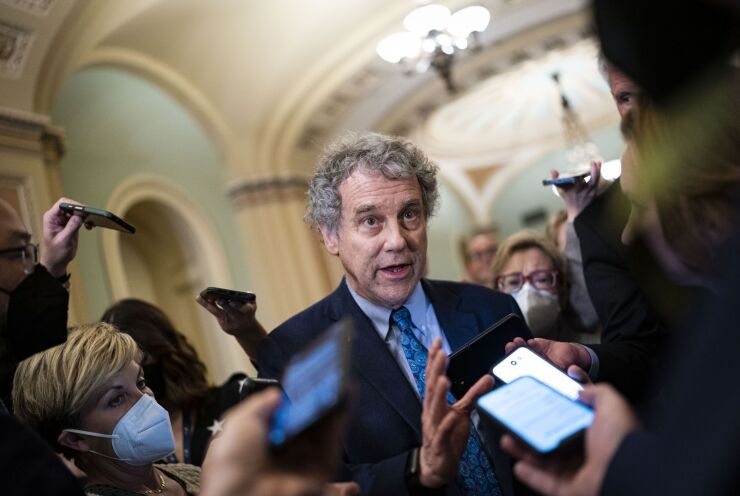WASHINGTON — More than a dozen Senate Democrats revived a push on Tuesday to extend civil rights-style protections for consumers seeking financial services.
The bill, the Fair Access to Financial Services Act, was
The

“Too many Black and brown Americans experience racial profiling and unequal treatment when trying to access services at banks and other financial institutions, and don’t have anywhere to turn to hold financial institutions accountable,” Brown said in a press release Tuesday. “Our legislation explicitly outlaws discrimination in our nation’s financial system so that everyone can access financial services free from harassment and abuse.”
Along with Brown, the legislation was co-sponsored by Democratic Sens. Raphael Warnock of Georgia, Bob Menendez of New Jersey, Catherine Cortez Masto of Nevada, Cory Booker of New Jersey, Tina Smith of Minnesota, Chris Van Hollen of Maryland, Elizabeth Warren of Massachusetts, Bernie Sanders of Vermont, Kirsten Gillibrand of New York, Alex Padilla of California, Tammy Duckworth of Illinois, Jeff Merkley of Oregon, Ed Markey of Massachusetts, Tammy Baldwin of Wisconsin, Sheldon Whitehouse of Rhode Island and Dianne Feinstein of California.
The original Civil Rights Act of 1964 banned discrimination from several public-facing institutions — namely hotels and restaurants — but did not extend its protections to banks and other financial institutions.
The second recent push for the Fair Access to Financial Services Act comes in the wake of several high-profile incidents of Black bank customers being mistreated by financial institutions, including an infamous case in March when Ryan Coogler, director of the acclaimed 2018 Marvel movie "Black Panther," was
“In 2022, no American should ever have to worry about being discriminated against when trying to open a bank account, getting a mortgage or starting a small business,” Warnock said in the press release.
The lawmakers’ press release said their bill had been endorsed by National Urban League, the Leadership Conference on Civil and Human Rights, the Center for Responsible Lending, the National Community Reinvestment Coalition, UnidosUS, the National Consumer Law Center, and the Lawyers’ Committee for Civil Rights Under Law.






